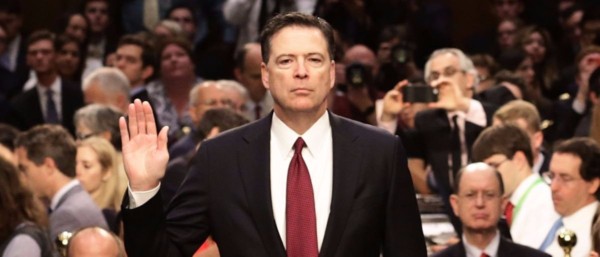
Why has the tough media — especially mainstream media — allowed James Comey, the former FBI director, to get away with avoiding the tough questions about his inappropriate and possibly unethical conduct of the Hillary Clinton emails investigation? Comey has also been downright evasive and, in one major respect, dishonest — and yet, the mainstream media for some reason doesn’t get tough and call him at it. This applies to The New York Times in a recent summary of Comey’s responses to questions and ABC News, during its tough interview by George Stephanopoulos on ABC network scheduled for Sunday night, April 15.
Here are the 10 tough questions not asked and answered by Comey:
1. Can you cite a single top Justice Department official in either party going back as far as you want who would justify an FBI investigator, including the FBI Director, publicly revealing the results of an ongoing criminal investigation – either directly or by speaking “on background,” anonymously to the media? Do you think such comments on the record or on background by an FBI investigator is a firing offense?
2. Do you agree that a federal investigator, including the FBI Director, is not allowed to offer a public criticism of someone under FBI investigation without charging that individual in an indictment so the individual can obtain due process to defend him- or herself?
3. Do you agree with the senior Justice Department Official told a Vanity Fair reporter in an article published in early 2017, referring to your characterization that Hillary Clinton was “extremely careless” in handling emails: “The one thing we don’t do [at the Justice Department”] is publicly shame and not charge?”
4. You claimed that you were “obligated” to send your October 28, 2016 letter to congress because you had promised congress you would do so if there were any new evidence regarding Hillary Clinton’s email practices after your July 5 non-prosecution decision. Do you now admit that you only promised congress you would “look at” any new evidence – NOT that you would inform them publicly, via a letter or otherwise?
5. Did you know that the attorneys for Mr. Anthony Weiner and Ms. Huma Abedin would have given the FBI permission to review the emails discovered on Mr. Weiner’s lap top computer without the need for a warrant? And if you didn’t know that, why didn’t you ask?
6. Did you get permission from the Deputy Attorney General, Sally Yates, before you decided to hold the July 5, 2016, public press conference to announce your no-prosecution recommendation concerning Hillary Clinton’s email practices? Or your characterization of the evidence of the investigation where you had decided not to recommend any prosecution as “extremely careless.” And if not, why not?
7. Do you agree that the FBI Director, and all FBI agents, work for the Department of Justice and are subject to supervision by the Attorney General, the Deputy Attorney General, and are required to comply with all Justice Department policies, rules, and U.S. Attorney guidelines? And specifically, do you believe the FBI Director and FBI agents are not allowed to choose which DOJ policies, rules, and guidelines they are allowed to ignore?
8. Which is more important: your and the FBI’s reputation or your following the law and being part of the Justice Department and required to be accountable to the attorney general and deputy attorney general?
9. Do you think J. Edgar Hoover’s willingness to take political considerations into account when making decisions was a good role model for you to follow? When you decided to send the October 28, 2016 letter to congress because you were concerned about the political reaction to Hillary Clinton’s election if you did not send such a letter, that taking such political considerations into account when you made such a momentous decision was appropriate?
10. Do you see your application of a double standard when you chose to write your October 28 letter public concerning Hillary Clinton’s emails on the Wiener lap top but chose not to reveal the existence of an ongoing FBI investigation that Russia had actively meddled in the U.S. presidential election in favor of Mr. Trump?
Lanny Davis served as Special Counsel to President Bill Clinton (1996 to 1998). His most recent book is The Unmaking of the President 2016: How James Comey Cost Hillary Clinton the Election.
Source: The Daily Caller
